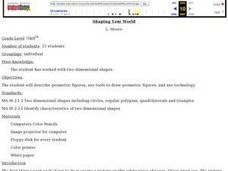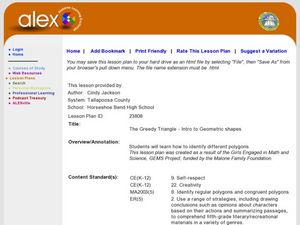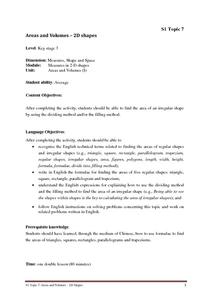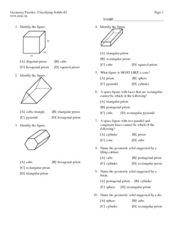Illustrative Mathematics
3-D Shape Sort
From the apple on your desk and the coffee cup in your hand, to the cabinets along the classroom wall, basic three-dimensional shapes are found everywhere in the world around us. Introduce young mathematicians to the these common figures...
Curated OER
Mining Shapes
In this 2-D shapes lesson, kindergarteners review plane shapes attributes. They engage in a shape hunt in the classroom and create art using plane shapes. A good, hands-on lesson!
Curated OER
Can You Name That Shape?
Learners use materials to build, investigate, and draw two-dimensional shapes (polygons). They combine the shapes they have built and draw from the pile to begin a round-robin activity to name and determine the attributes of a selection...
Utah Education Network (UEN)
Geo Shapes
Invite your first graders to compose and decompose two and three-dimensional figures with this fun, hands-on lesson. They investigate and predict the results of putting together and taking apart two-dimensional shapes with rubber bands...
Learner
Solid Shapes
A collection of two lessons, kindergartners will identify two-dimensional shapes in solid shapes. They will develop basic knowledge of the components that make up a sphere, rectangular prism, pyramid, cylinder, cone, and cube. Young...
Curated OER
Compare 2-D Shapes
Second graders examine the attributes of two-dimensional shapes. In this geometry lesson plan, 2nd graders play a game in order to identify two-dimensional shapes and to name them.
Math Solutions
Shape Sorting: Looking for Green!
Young mathematicians rotate, flip, and sort their way to an understanding of the different attributes of geometric figures. Using transparent yellow and blue shapes, children try to match congruent figures together...
Curated OER
Shaping Your World
Learners describe geometric figures. They create pictures and list each shape they used to create their pictures. They discuss the importance of shapes in their lives and create ten different geometric shapes using the Drawing tools in...
Curated OER
The Greedy Triangle-Intro to Geometric Shapes
In this geometry lesson, learners read The Greedy Triangle and use geoboards to construct geometric shapes. They identify the number of sides and angles each shape has.
Government of Hong Kong
Areas and Volumes - 2D Shapes
Unfortunately for young mathematicians, the world isn't made entirely of parallelograms, triangles, and trapezoids. After first learning the area formulas for these common shapes, students apply this new knowledge to...
Curated OER
2-D and 3-D Presents at Pedro's Party
Fifth graders draw 2-D and 3-D shapes. They sketch and label geometric figures with correct terminology, then explore parallel and perpendicular lines. Pupils sort and classify shapes drawn.
American Farm Bureau Foundation for Agriculture
Shapes in Agriculture
It's time to get crafty with shapes! Your future farmers demonstrate their geometric ability by building a farm using triangles, circles, rectangles, and squares. But first, scholars take part in a brainstorm session inspired by their...
Curated OER
3-D Figures Part 1
Elementary schoolers explore 3-D shapes. They transition from thinking of shapes as only 2-D. Pupils read Cinderella as a launching activity for their upcoming adventure, and explore a new world of 3-D shapes in this introductory lesson.
Curated OER
Geometry Practice: Classifying Solids #2
In this solids worksheet, students identify the characteristics of solids. They name solids and determine the number of faces. This three-page worksheet contains seventeen problems. Answers are listed on the last page.
Curated OER
Shape Up!
An outstanding lesson on teaching the basic shapes and polygon names to young geometers is here for you. In it, learners investigate the role of basic polygons in the strength of structures. They use geoboards, rubber bands, streamed...
Curated OER
Symmetry and Geometric Shapes on Campus
Build on your learners' previous knowledge of geometric shapes and symmetrical figures. Then set them out to take photos of geometric shapes on campus. They assess whether the photos contain symmetry or not.
Curated OER
Shapes in Our World
Help your students explore shapes. They classify shapes and identify them in their everyday world. Plane shapes are explored, and they classify and identify the plane shapes.
Pennsylvania Department of Education
A Geometric Scavenger Hunt
Fifth graders connect their knowledge of polygons and polyhedrons. For this geometric shapes lesson, 5th graders identify and classify two- and three-dimensional objects. Students construct a polyhedron out of polygons and describe their...
Curated OER
2: Isle of Shapes - Based on the Puerto Rico Quarter Reverse
Learners identify both two and three-dimensional shapes. In this geometric shapes instructional activity, students listen to a teacher led instructional activity about the island of Puerto Rico. They look at the symbols and shapes on...
Curated OER
Shapes
Students identify attributes of different geometric shapes. In this geometry lesson plan, students view a PowerPoint presentation on shapes and use attribute blocks to examine the corners and edges of each shape. Students work...
Curated OER
Living in a Geometrical World
Students participate in a series of hand-on, online, and multimedia activities to examine 2 dimensional and 3 dimensional shapes. They describe common geometric solids. They construct rectangular prisms using straws and ribbon.
Curated OER
Great Shapes Alive!
Compare two- and three-dimensional shapes and construct three dimensional models from two-dimensional shapes. Diagram the shapes and reflect about the process in writing.
Curated OER
Using the Web to Explore Shapes
Third graders research the Internet to locate geometric designs in familiar buildings. They review shapes, solids, angles and symmetry as they research websites of familiar buildings in Louisville. They record the information they see...
Curated OER
Parallel and Perpendicular Lines
Learners study parallel and perpendicular lines. For this parallel and perpendicular lesson, pupils explore 2-D shapes and determine if the sides are parallel or perpendicular.























